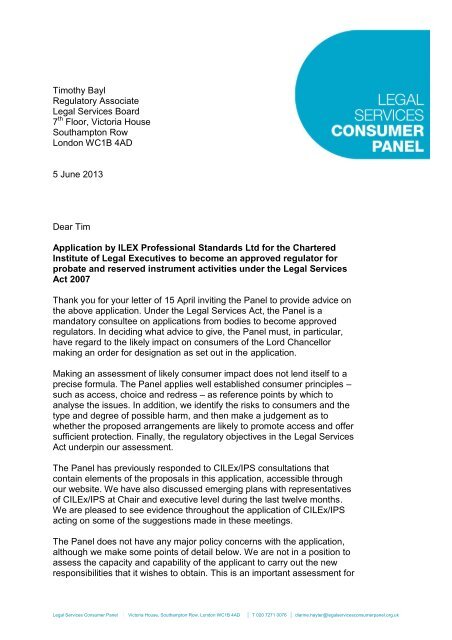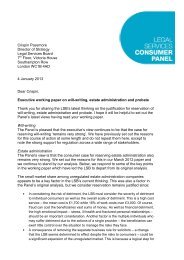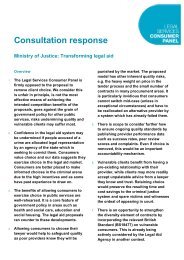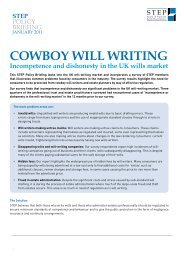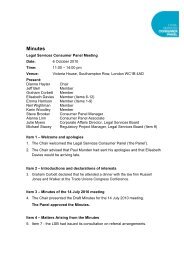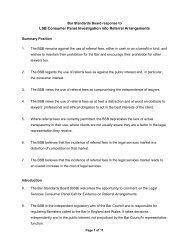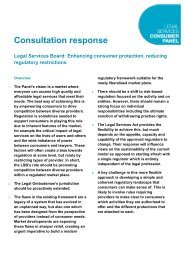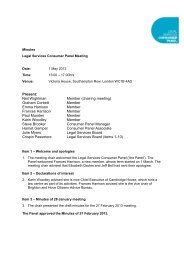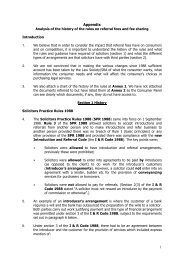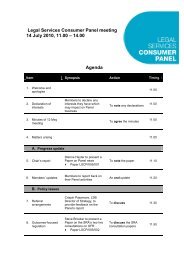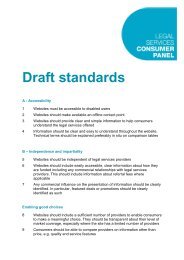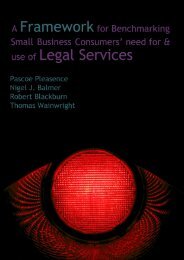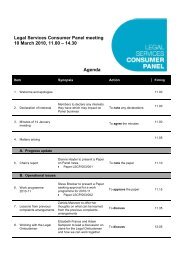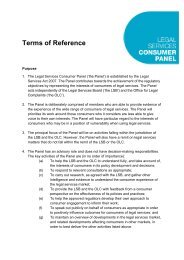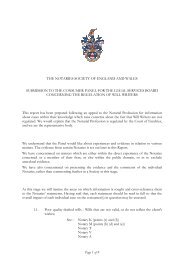Response to CILEX application to become an approved regulator
Response to CILEX application to become an approved regulator
Response to CILEX application to become an approved regulator
Create successful ePaper yourself
Turn your PDF publications into a flip-book with our unique Google optimized e-Paper software.
Timothy Bayl<br />
Regula<strong>to</strong>ry Associate<br />
Legal Services Board<br />
7 th Floor, Vic<strong>to</strong>ria House<br />
Southamp<strong>to</strong>n Row<br />
London WC1B 4AD<br />
5 June 2013<br />
Dear Tim<br />
Application by ILEX Professional St<strong>an</strong>dards Ltd for the Chartered<br />
Institute of Legal Executives <strong>to</strong> <strong>become</strong> <strong>an</strong> <strong>approved</strong> regula<strong>to</strong>r for<br />
probate <strong>an</strong>d reserved instrument activities under the Legal Services<br />
Act 2007<br />
Th<strong>an</strong>k you for your letter of 15 April inviting the P<strong>an</strong>el <strong>to</strong> provide advice on<br />
the above <strong>application</strong>. Under the Legal Services Act, the P<strong>an</strong>el is a<br />
m<strong>an</strong>da<strong>to</strong>ry consultee on <strong>application</strong>s from bodies <strong>to</strong> <strong>become</strong> <strong>approved</strong><br />
regula<strong>to</strong>rs. In deciding what advice <strong>to</strong> give, the P<strong>an</strong>el must, in particular,<br />
have regard <strong>to</strong> the likely impact on consumers of the Lord Ch<strong>an</strong>cellor<br />
making <strong>an</strong> order for designation as set out in the <strong>application</strong>.<br />
Making <strong>an</strong> assessment of likely consumer impact does not lend itself <strong>to</strong> a<br />
precise formula. The P<strong>an</strong>el applies well established consumer principles –<br />
such as access, choice <strong>an</strong>d redress – as reference points by which <strong>to</strong><br />
<strong>an</strong>alyse the issues. In addition, we identify the risks <strong>to</strong> consumers <strong>an</strong>d the<br />
type <strong>an</strong>d degree of possible harm, <strong>an</strong>d then make a judgement as <strong>to</strong><br />
whether the proposed arr<strong>an</strong>gements are likely <strong>to</strong> promote access <strong>an</strong>d offer<br />
sufficient protection. Finally, the regula<strong>to</strong>ry objectives in the Legal Services<br />
Act underpin our assessment.<br />
The P<strong>an</strong>el has previously responded <strong>to</strong> CILEx/IPS consultations that<br />
contain elements of the proposals in this <strong>application</strong>, accessible through<br />
our website. We have also discussed emerging pl<strong>an</strong>s with representatives<br />
of CILEx/IPS at Chair <strong>an</strong>d executive level during the last twelve months.<br />
We are pleased <strong>to</strong> see evidence throughout the <strong>application</strong> of CILEx/IPS<br />
acting on some of the suggestions made in these meetings.<br />
The P<strong>an</strong>el does not have <strong>an</strong>y major policy concerns with the <strong>application</strong>,<br />
although we make some points of detail below. We are not in a position <strong>to</strong><br />
assess the capacity <strong>an</strong>d capability of the applic<strong>an</strong>t <strong>to</strong> carry out the new<br />
responsibilities that it wishes <strong>to</strong> obtain. This is <strong>an</strong> import<strong>an</strong>t assessment for<br />
Legal Services Consumer P<strong>an</strong>el Vic<strong>to</strong>ria House, Southamp<strong>to</strong>n Row, London WC1B 4AD T 020 7271 0076 di<strong>an</strong>ne.hayter@legalservicesconsumerp<strong>an</strong>el.org.uk
the LSB <strong>to</strong> make given that CILEx proposes <strong>to</strong> regulate entities for the first<br />
time <strong>an</strong>d the high potential fin<strong>an</strong>cial detriment involved in convey<strong>an</strong>cing.<br />
Overall regula<strong>to</strong>ry approach<br />
It is proposed that probate <strong>an</strong>d convey<strong>an</strong>cing practitioners will be subject<br />
<strong>to</strong> regulation <strong>an</strong>d authorisation in respect of the full r<strong>an</strong>ge of work they<br />
undertake in these areas, e.g. probate practitioners must also be<br />
competent <strong>to</strong> undertake will-writing <strong>an</strong>d estate administration, where they<br />
wish <strong>to</strong> carry out these activities. The P<strong>an</strong>el wishes <strong>to</strong> put on record its<br />
strong support for this proposal due <strong>to</strong> the high risk of consumer detriment<br />
stemming from these activities <strong>an</strong>d the need <strong>to</strong> minimise consumer<br />
confusion. These activities will often be offered as a seamless package<br />
<strong>an</strong>d will seem so in consumers‟ eyes, regardless of the regula<strong>to</strong>ry<br />
implications. We also support the proposed broad approach <strong>to</strong> reserved<br />
instrument activities for the same reasons.<br />
We also wish <strong>to</strong> place on record our support for the proposed authorisation<br />
by competence model. This places <strong>an</strong> appropriate emphasis on preventing<br />
detriment through assuring initial <strong>an</strong>d ongoing competence. It also accords<br />
with the ideas around activity-based regulation contained in the P<strong>an</strong>el‟s<br />
submission <strong>to</strong> the Legal Education <strong>an</strong>d Training Review. Welcome <strong>to</strong>o is<br />
the broad definition of competence <strong>to</strong> include client care skills.<br />
Consumer engagement<br />
It is welcome that IPS has developed a strategy <strong>an</strong>d action pl<strong>an</strong> for<br />
engaging with consumers. We recognise that IPS has limited resources for<br />
such activities, but it has clearly made <strong>an</strong> effort <strong>to</strong> draw insights from<br />
research commissioned by others, has carried out small scale surveys of<br />
its own <strong>an</strong>d has shown ambition with its cus<strong>to</strong>mer feedback website idea.<br />
This is <strong>an</strong> area where much is promised but the proof will be in the eating,<br />
<strong>an</strong>d as such is one aspect where the LSB might consider capacity issues.<br />
For example, it would be helpful <strong>to</strong> know the scale of investment pl<strong>an</strong>ned<br />
for consumer engagement over the next period.<br />
The cus<strong>to</strong>mer feedback website is innovative, although we have some<br />
doubts about whether it will achieve sufficient participation <strong>an</strong>d recognition<br />
<strong>to</strong> inform consumer choice. Making it compulsory for all entities <strong>to</strong> take part<br />
in the initiative, rather th<strong>an</strong> rely on soft incentives <strong>to</strong> encourage entities <strong>to</strong><br />
sign up, would mitigate this. The P<strong>an</strong>el is aware of the „Legal Voices‟<br />
website being developed by the Solici<strong>to</strong>rs Regulation Authority, which we<br />
underst<strong>an</strong>d will be open <strong>to</strong> all the <strong>approved</strong> regula<strong>to</strong>rs. The P<strong>an</strong>el‟s report<br />
on empowering consumers highlighted fragmentation of information<br />
provision as a barrier <strong>to</strong> informed choice. While the remits of the two<br />
websites are not identical they appear <strong>to</strong> cover a lot of similar ground.<br />
Therefore, we would be interested <strong>to</strong> know why IPS has chosen <strong>to</strong> pursue<br />
a separate initiative of its own.<br />
Consumer vulnerability<br />
A consumer or client is considered by IPS <strong>to</strong> have some form of<br />
vulnerability: “if, in obtaining or seeking <strong>to</strong> obtain legal services, they are at<br />
risk of encountering difficulties arising from <strong>an</strong>y specific or general<br />
Legal Services Consumer P<strong>an</strong>el Vic<strong>to</strong>ria House, Southamp<strong>to</strong>n Row, London WC1B 4AD T 020 7271 0076 di<strong>an</strong>ne.hayter@legalservicesconsumerp<strong>an</strong>el.org.uk
limitations as <strong>to</strong> their physical abilities, sensory abilities, cognitive abilities,<br />
linguistic abilities, geographic location, economic resources or <strong>an</strong>y<br />
combination of these”.<br />
The code of practice has been strengthened with respect <strong>to</strong> vulnerable<br />
clients. While a welcome step in the right direction, we are not satisfied<br />
that its current treatment of vulnerability satisfies best practice as set out in<br />
the relev<strong>an</strong>t British St<strong>an</strong>dard (BS18477). The key is <strong>to</strong> focus on the<br />
circumst<strong>an</strong>ces that make people vulnerable, including the actions of<br />
providers <strong>an</strong>d features of markets, rather th<strong>an</strong> just a person‟s inherent<br />
characteristics. In addition, vulnerability c<strong>an</strong> be tr<strong>an</strong>si<strong>to</strong>ry in nature, i.e.<br />
people c<strong>an</strong> be vulnerable at some times, but not at others. Instead of<br />
defining consumers in specific groups as always vulnerable, the st<strong>an</strong>dard<br />
identifies „risk fac<strong>to</strong>rs‟ related <strong>to</strong> a person‟s circumst<strong>an</strong>ces – such as<br />
bereavement, illiteracy, illness or disability – which could increase the<br />
likelihood of a consumer being at a disadv<strong>an</strong>tage or suffering detriment.<br />
The P<strong>an</strong>el has shared the st<strong>an</strong>dard with IPS <strong>an</strong>d the LSB has agreed <strong>to</strong><br />
invite <strong>approved</strong> regula<strong>to</strong>rs <strong>to</strong> demonstrate how they have incorporated the<br />
st<strong>an</strong>dard in<strong>to</strong> their work. Of course, BS18477 does not provide the only<br />
acceptable definition of consumer vulnerability, but it has much credibility<br />
having being developed in partnership with consumer <strong>an</strong>d disability<br />
groups. It would also be helpful for the <strong>approved</strong> regula<strong>to</strong>rs <strong>to</strong> have a<br />
consistent approach. We note that the Council for Licensed Convey<strong>an</strong>cers<br />
has incorporated the key elements of the st<strong>an</strong>dard directly in<strong>to</strong> its code of<br />
conduct <strong>an</strong>d we would encourage IPS <strong>to</strong> do likewise.<br />
Code of conduct<br />
The revised code takes the consumer outcomes identified in the LSB‟s<br />
research as its starting point <strong>an</strong>d tr<strong>an</strong>slates these in<strong>to</strong> broad principles.<br />
This is commendable as <strong>an</strong> effort <strong>to</strong> build the regula<strong>to</strong>ry framework around<br />
consumer needs, although research should be one only source of<br />
inspiration for the code. However, this approach has resulted in quite a<br />
specific list of service features <strong>an</strong>d it is possible <strong>to</strong> think of alternatives<br />
which are not covered. This could be addressed by introducing a single<br />
overarching principle, such as <strong>to</strong> „provide a good st<strong>an</strong>dard of service‟ or<br />
„treat clients fairly‟ which could act as a catch-all mech<strong>an</strong>ism. We note that<br />
the SRA‟s code contains such a generic principle.<br />
Fin<strong>an</strong>cial protection<br />
Overall, the P<strong>an</strong>el was pleased <strong>to</strong> see that IPS has set out detailed<br />
arr<strong>an</strong>gements for professional indemnity insur<strong>an</strong>ce <strong>an</strong>d compensation<br />
arr<strong>an</strong>gements which offer comprehensive coverage of the key risks.<br />
However, one issue is the compensation gr<strong>an</strong>t limit of £500,000 per claim<br />
is <strong>to</strong>o low given that losses from convey<strong>an</strong>cing tr<strong>an</strong>sactions may involve<br />
higher values. Although such claims are likely <strong>to</strong> be rare, m<strong>an</strong>y properties<br />
are worth in excess of this figure; consumers who lose out due <strong>to</strong><br />
incompetent or fraudulent legal advice should expect <strong>to</strong> be reimbursed.<br />
We note that the Solici<strong>to</strong>rs Regulation Authority‟s gr<strong>an</strong>t limit is £2 million.<br />
In addition, the P<strong>an</strong>el has been asked by the LSB <strong>to</strong> assess the adequacy<br />
of regula<strong>to</strong>rs‟ fin<strong>an</strong>cial protection arr<strong>an</strong>gements overall. This advice will be<br />
Legal Services Consumer P<strong>an</strong>el Vic<strong>to</strong>ria House, Southamp<strong>to</strong>n Row, London WC1B 4AD T 020 7271 0076 di<strong>an</strong>ne.hayter@legalservicesconsumerp<strong>an</strong>el.org.uk
published shortly. In general we have found the arr<strong>an</strong>gements proposed<br />
by IPS <strong>to</strong> be in line with the arr<strong>an</strong>gements of other regula<strong>to</strong>rs. At a high<br />
level these provide the right degree of consumer protection. However, we<br />
have found a number of areas which deserve closer attention across the<br />
regula<strong>to</strong>ry regimes as a whole, including:<br />
An absence of research <strong>to</strong> test consumer experience of accessing<br />
schemes.<br />
Caps on cover at different levels depending on the regula<strong>to</strong>r: these<br />
inconsistencies are hard <strong>to</strong> explain.<br />
Lack of published perform<strong>an</strong>ce data making the effectiveness of the<br />
protections difficult <strong>to</strong> assess, while a lack of claims data or<br />
perform<strong>an</strong>ce reporting makes for poor accountability.<br />
An apparent lack of information sharing between different regula<strong>to</strong>rs.<br />
Regimes are currently based on professional title rather th<strong>an</strong> activity<br />
or risk.<br />
The discretionary nature of compensation funds, which gives rise <strong>to</strong> a<br />
number of problems, including caps on the payment of claims.<br />
A lack of information on how claims are assessed given the<br />
discretionary nature of compensation funds.<br />
A lack of risk-based contributions from practitioners for compensation<br />
funds.<br />
These are areas which we would expect IPS <strong>to</strong> address in future if they<br />
move forward with their <strong>application</strong>.<br />
Please contact Steve Brooker, Consumer P<strong>an</strong>el M<strong>an</strong>ager, for enquiries in<br />
relation <strong>to</strong> this submission.<br />
Yours sincerely<br />
Elisabeth Davies<br />
Chair<br />
Legal Services Consumer P<strong>an</strong>el Vic<strong>to</strong>ria House, Southamp<strong>to</strong>n Row, London WC1B 4AD T 020 7271 0076 di<strong>an</strong>ne.hayter@legalservicesconsumerp<strong>an</strong>el.org.uk


